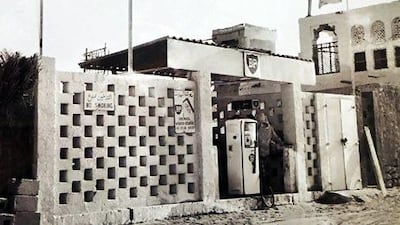Commercial ties between the United Kingdom and the UAE go back as far as the 17th century when British ships would pass the desert coasts of Oman, Dubai, Ras Al Khaimah, Sharjah and Abu Dhabi as they sailed the important trade routes to Asia dominated by Britain's East India Company.
And trade remains a key ingredient of relations between the two friendly countries. Tomorrow Sheikh Khalifa, President of the UAE, starts a two-day state visit to Britain after accepting an invitation from Queen Elizabeth II.
Matters were not so cordial initially, however. So it was with great relief in January 1820 that the British government reached a crucial diplomatic and commercial accord with the sheikhs of what was then called the Arab Coast.
The General Maritime Peace Treaty helped to ensure that cargos of tea, silk, spices and other goods from the east would reach their destination in Britain safely.
Some three decades later the accord was underscored as the Arab Coast sheikhdoms were renamed the Trucial States and the General Peace Treaty became the Perpetual Peace Treaty in 1853.
In return for security of trade routes, Britain agreed to take care of all defence and foreign relations on behalf of the sheikhs. This political and military relationship paved the way for more than a century of strong commercial ties between Britain and what would become the UAE.
BP, which had been working in the Gulf since 1909 under its former Anglo-Persian Oil Company moniker, turned its attention to Abu Dhabi and Dubai in 1935 when exploration for oil began in earnest. The company had been in Sharjah since 1930, however, when it established a refuelling station for British planes coming back from India.
The first wells were drilled in 1950 with the first commercial discovery struck off the shores of Abu Dhabi some eight years later.
BP also established the first petrol station in Abu Dhabi, a single pump with the familiar yellow and green insignia proudly emblazoned on the top, surrounded by a crude concrete block wall.
So it was a British oil company that helped Abu Dhabi to realise its great hydrocarbon wealth. And BP was not alone. Shell, an Anglo-Dutch combine, would soon join the fold to assist with the oilfield development of the Emirates.
In the four decades since the UAE was formed, British business has been central to the development of the country's economy.
Furthermore, as Dominic Jermey, the British Ambassador to the UAE, points out, Emirati businesses and investments are becoming more and more important to the UK.
"Adnec [the Abu Dhabi National Exhibitions Company] has a very large business in Britain, it owns the Excel centre, which was [a] venue for the Olympics last year," he says.
"Taqa, the Abu Dhabi energy company, is very active in the North Sea and has invested US$4 billion into the United Kingdom. Dubai Ports World is creating the largest port and infrastructure park in North London and Masdar is part of the London array powering London homes with wind power."
More than 4,000 British companies operate in the UAE today, and some of them have been here for more than 80 years.
Lord Denman, the first banker in Abu Dhabi, loved the emirate so much that he came back to visit every year right up until his death last December at the age of 96.
The former British Army Light Infantryman, decorated war hero and Arabist was a close confidant of Sheikh Zayed and a director of the British Bank of the Middle East, a predecessor of HSBC, now the biggest foreign bank in the country.
Those who met Lord Denman, such as Frances Moffett-Kouadio, the director of UK Trade and Investment at the British Embassy in Abu Dhabi, say he was one of a handful of Brits who came to define the close and personal commercial relationship between the UK and the emirates that are now the UAE.
"He basically started the financial services industry in this country and he was very highly regarded by the older generations of Emiratis," Mrs Moffett-Kouadio recalls. "He was quite a character, even at an advanced age he had a real twinkle in his eye."
The emirates were a very different place in Lord Denman's era than today though. In 1957, for example, there were only 12 expatriates living in Dubai, according to a report written by Christopher Meyer from the British surveying firm Windell & Trollope. All of them were British.
They were, according to Meyer's records: "Political Agent Tripp (on leave) - Assistant. Adams Agency Admin - Gunston B.P. - Jackson I.P.C. - Kirkbridge and Wife - Doctor McAuliffe - Bank Manager King and two Assistants - Agriculturist Huntingdon - Police Chief Larrimer". Today, of the 7 million or so expats in the UAE, there are an estimated 120,000 Brits.
Aside from oil, the UAE is known the world over for its ambitious urban development.
Few people know, however, that it was another Brit, a man named John Harris, whom Sheikh Rashid, the former Ruler of Dubai, hired to be the emirate's first town planner. He even designed Dubai's first skyscraper, the Dubai World Trade Centre.
The layout of the city, the positioning of key infrastructure like hospitals, schools and roads were all laid out in a document known as The Harris Masterplan, which is still referred to today.

